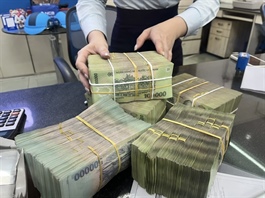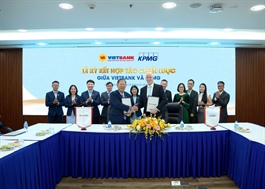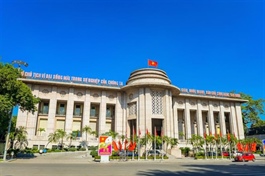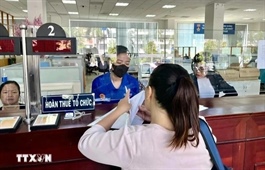Anti-laundering legal holes being bridged
Anti-laundering legal holes being bridged
The banking sector is intensifying efforts to strengthen the legal framework and implement robust measures to combat money laundering in cross-border payments and remittance services, safeguarding the economy and the national financial system.

A new code of conduct will help banks in Vietnam carry out standardised procedures, photo Le Toan |
Due to the varying risk appetites of different credit institutions, the documentation for international payment and money transfer transactions has not been standardised, leading to unhealthy competition within the banking system.
To create a fair playing field and a common standard for credit institutions to implement uniformly, the Vietnam Banks Association (VNBA) issued a unified code of conduct and practices for remittances abroad on February 7. This was developed in collaboration with the Foreign Exchange Management Department of the State Bank of Vietnam (SBV) and other credit institutions.
Dao Xuan Tuan, director of the department, declared that the code serves as a common standard for banks to reference and implement, which has been actively and urgently executed by the VNBA and credit institutions.
“Along with anti-money laundering regulations, the code provides a basis for authorities to reference, facilitating the management, inspection, and monitoring of international payment and money transfer activities,” Tuan said.
Currently, in addition to the guiding documents from the SBV regarding payment and money transfer activities for current transactions, credit institutions now also have the framework for the necessary documentation specific to one-way money transfers from Vietnam abroad, added Tuan.
“This will serve as the foundation for risk control and anti-money laundering measures in the provision of payment services, while adhering to international standards, ensuring money transfers abroad are made for legitimate purposes, in compliance with regulations, and preventing illegal transfers abroad,” he said.
Dr. Nguyen Quoc Hung, vice chairman and general secretary of the VNBA, told VIR that although the legal framework is relatively comprehensive, controlling international payments and money transfers through the banking system still faces different challenges.
“In practice, each bank has its own internal regulations on transfer documentation, resulting in inconsistency in implementation. The same set of documents might be accepted by one bank but rejected by another due to differing internal regulations,” Hung said.
He pointed out that while this is not a legal document, it serves as the basis for banks to implement it as a market practice. The code is designed to become the framework regulation for one-way money transfers abroad by Vietnamese residents.
“The issuance of the code will help banks across the country implement standardised procedures, reduce risks, and assist regulatory authorities in controlling illegal money flows more effectively, contributing to stabilising the foreign exchange market and exchange rates, and attracting investment,” added Hung.
“For the public, the code simplifies the process of one-way money transfers abroad. Instead of seeking out banks with specific regulations, customers can now visit any bank offering this service to complete their transaction,” Hung said.
At a February 14 conference on anti-money laundering and counter-terrorist financing for enterprises in the life insurance sector, hosted by the finance and public security ministries as well as the SBV, Nguyen Quang Huyen, deputy director of the Department of Insurance Supervision and Management, emphasised that the current legal regulations in insurance business are being supplemented and amended, to align with international standards, thus contributing to the protection of the stability of the economy and national security.
“We require insurance companies to implement anti-money laundering measures in accordance with regulations, ensuring compliance with their duties,” Huyen said. “Among these is the obligation for insurance companies to establish regulations and appoint departments responsible for anti-money laundering efforts, monitor, and remind insurance companies to submit anti-money laundering data to the SBV.”
Nguyen Thi Minh Tho, deputy director of the Anti-Money Laundering Department at the SBV, underlined the necessity of developing a legal framework to regulate or ban virtual assets and virtual asset service providers while ensuring compliance with regulatory measures.
“Regarding the insurance sector, customer identification is crucial as the foundation for classifying clients according to money laundering risk levels. Insurance companies need to collect, update, and verify customer information, update customer identification details, and confirm this information either directly or through third-party service providers,” added Tho.
As part of efforts to enhance international money transfer oversight and combat money laundering, the SBV held two internal workshops on February 13 to introduce risk-based supervision and monitoring of anti-money laundering and counter-terrorism financing controls, developed with International Monetary Fund (IMF).
Representatives shared that based on initial completion of this, the SBV had requested 100 banks and foreign bank branches in Vietnam to provide information. To date, it has essentially completed the risk assessment of the reporting organisations.
The IMF also stated that the organisation of workshops introducing the code to stakeholders was the next step in implementing its technical assistance project.
“We appreciate the efforts of the SBV in developing and deploying the code and emphasises that the prompt reporting by commercial banks and foreign bank branches in Vietnam, as well as their active participation in the workshops, will provide a basis for effective inspection, monitoring, and supervision of risk-based anti-money laundering and counter-terrorist financing activities in Vietnam in the future,” said an IMF expert during the session.
- 10:20 27/02/2025
























